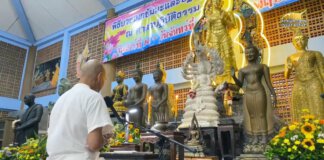ขอเห็นต่างนะจ๊ะ หวังว่าจะไม่โกรธกัน (ตอนที่ ๓)
๒๙ กันยายน ๒๕๖๗
*******************************
ส่วนหนึ่งของคลิปพระอาจารย์ต้น หัวข้อ (ควรสวดมนต์บทไหนดี)
พิธีกร : บางคนบรรลุธรรมได้จากการสวดสาธยายธรรม แล้วมันไม่ใช่สวดมนต์เหรอคะพระอาจารย์
พระ อ. ต้น : การสวดสาธยายธรรมมันคือการสวดด้วยความเข้าใจในเนื้อหาแห่งการสวด แล้วการสวดนั้นเป็นลักษณะของการสวดในลักษณะที่เรียกว่าการท่องบ่นทรงจำแล้วพิจารณาเนื้อหาแห่งธรรมนั้นให้เกิดความกระจ่างแจ้ง แต่ปรากฏว่าบทสวดที่เราสวดกันอยู่ในเวลานี้เป็นบทสวดที่เราไม่ได้เข้าใจเนื้อหาของบทสวดเลย และการที่เราไม่ได้เข้าใจก็ไม่เกิดการเพ่งพินิจในธรรมจนเข้าไปถึงความรู้ในบทธรรมนั้นอย่างแจ่มแจ้งได้ การสวดมนต์แล้วได้รับการตอบสนองในทางที่ดีจนกลายเป็นค่านิยมเพื่อที่จะสวดกัน และมีการชักชวนกันสวด ถามว่าการสวดมนต์นั้นส่งผลต่อการอำนวยผลตอบสนองของเราหรือไม่ พระอาจารย์ก็จะบอกว่า มันก็สามารถส่งผลได้ เพราะว่าการสวดมนต์ด้วยจิตที่ตั้งมั่น มันก่อให้เกิดสมาธิ
(เอาไหนตอนแรกบอกว่า การสวดมนต์ไม่ดี จักเป็นอุปสรรคในการรู้ทุกข์ รู้เหตุเกิดทุกข์ รู้ทางดับทุกข์ รู้ข้อปฏิบัติของการดับทุกข์ ไม่ได้ไงจารย์ สรุปแล้วการสวดมนต์มันดีหรือไม่ดีหละจารย์)
แต่อย่าลืมว่าสมาธิประเภทนั้นไม่ใช่สมาธิที่พระพุทธองค์สรรเสริญ
(แล้วจารย์จะอธิบายคำว่า สัมมาสมาธิว่าอย่างไร ที่มันตรรกะของคนป่วยจิตชัดๆ
จารย์รู้ไหมว่า คำว่า สัมมาสมาธิ แปลว่า สมาธิชอบ คือความตั้งใจมั่นโดยถูกทาง โดยการที่จิตตั้งมั่นอยู่ในกุศลจิตมีอารมณ์เป็นอันเดียว ความตั้งมั่นแห่งกุศลจิตในในอารมณ์อันใดอันหนึ่ง ไม่ฟุ้งซ่าน
การสวดมนต์แล้วจิตรวมตัว แน่วแน่ ตั้งมั่น มีอารมณ์เดียว หรือ อุเบกขารมณ์ แล้วพระพุทธเจ้าจักไม่สรรเสริญได้ไงจารย์ นี่จารย์หลงละเมิด มโนเอาเองหรือเปล่าเนี่ยจารย์ ไหนคุยโวว่าเป็นโสดา แล้วเรื่องง่ายๆ แค่นี้ยังไม่รู้ สรุปแล้วโสดาหรือโซดา)
แล้วชีวิตเราไม่ใช่มีชีวิตเพียงเพื่อที่จะสวดให้ได้รับผลตอบสนองในสิ่งที่เราต้องการไปตลอดทั้งชีวิต แต่หมายถึงการสร้างสติปัญญาดับทุกข์ให้กับตัวเราเอง ฉะนั้น บทมนต์จึงไม่ใช่วิธีการในหลักการทางพระพุทธศาสนา ถึงแม้การสวดนั้นจะอำนวยผลตอบสนองให้ได้ก็จริง แต่เป็นผลที่พระพุทธองค์ไม่ได้ต้องการให้เราเอาชีวิตไปฝากไว้กับบทสวดเหล่านั้น เพราะชีวิตเรามันสามารถพัฒนาตนเองได้ไปถึงขั้นที่เรียกว่า “สติปัญญา” เข้าถึงความดับทุกข์ได้ภายในตัวเราเอง
(เวรแล้วกู และสติปัญญา มันจะมาจากไหนหละจารย์ หากไม่สั่งสม อบรมมาจากสวดภาวนา และเรียนรู้ศึกษา ฝึกหัดปฏิบัติ)
การที่มีคนบอกผลอานิสงส์ของการสวดว่า ได้รับผลแบบนั้นแบบนี้ จริงๆ ได้มาจากสมาธิที่เราสวดในระหว่างนั้น ตัวบทสวดเองบางครั้งเราไม่ได้แยกแยะให้เห็นว่า การสวดที่นำมาซึ่งผลได้รับการตอบสนองตามที่เราต้องการแล้วเราก็หยุดอยู่เพียงแค่การเห็นผลตามที่เราต้องการ แต่เราไม่ได้เห็นว่าในบทสวดนั้นมันมีโทษตามมาด้วย
(บทสวดแบบไหนหรือจารย์ที่มันมีโทษ)
การที่เราสวดบทสวดที่ให้ผลตอบสนองกับเราแล้วไม่ได้เห็นว่ามันมีโทษตามมา นี่คือปัญหาของผู้สวด ที่บางทีบทสวดนั้นนั่นเองทำให้เขาเกิดภาวะที่มันไม่ดีในชีวิตของเขาในภายหลัง พระอาจารย์เคยเห็นคนที่อยู่กับการสวดมนต์แล้วเกิดภาวะควบคุมตัวเองไม่ได้ เพราะบทสวดแต่ละบทมันส่งผลในการที่จะดึงดวงจิตดวงใจบางดวงเข้ามาแฝงเร้นตามบทสวดที่เราได้สวดไป
(ดูท่าจารย์จะเคยไปดูเขา เข้าทรงมาหละมั่งจารย์ ถึงได้ฝังใจมาแอนตี้การสวดมนต์)
ซึ่งนั้นคือการสวดด้วยความไม่รู้ไม่เข้าใจของผู้สวดเอง เมื่อมีการอำนวยผลจากอำนาจของการสวดโดยมีวิถีของผู้แฝงเร้นในบทสวดมนต์นั้นเข้ามาสู่การสร้างผลอำนวยการตอบสนองให้กับเราและสมาธิที่เราได้ทำขึ้นในขณะที่สวด เขาส่งผลดีแล้วเขาก็ส่งผลร้ายในภายหลัง คือการเขาจะเกิดการแฝงเร้นและควบคุมภายในตัวเรา นี่แหละคือปัญหาที่จะตามมา
(จารย์พูดตีไข่ใส่สี การสวดมนต์เสียจนพระ เถร เณร ชี ทั้งโลกเขากลัวแล้วนะเนี่ยจารย์
ก็ทำไมเขาจะไม่กลัวเล่า เป็นถึงขั้นพระโสดา ออกมาพูดแบบนี้ ใครก็ต้องกลัวใช่ไหมจารย์
อย่างนี้กิจวัตร ๑๐ อย่าง ของพระเณร ก็คงต้องเลิกด้วยหรือเปล่าจารย์ โดยเฉพาะ การสวดมนต์ ทำวัตร
กิจวัตร ๑๐ อย่าง ของพระเณร ได้แก่
๑. ลงอุโบสถ
๒. บิณฑบาทเลี้ยงชีพ
๓. สวดมนต์ไหว้พระ
๔. กวาดอาวาสวิหารลานพระเจดีย์
๕. รักษาผ้าครอง
๖. อยู่ปริวาสกรรม
๗. โกนผมปลงหนวดตัดเล็บ
๘. การศึกษาสิกขาบทและปฏิบัติพระอาจารย์
๙. เทศนาบัติ
๑๐. พิจารณาปัจจเวกในขณะทั้ง ๔ เป็นต้น)
แต่บทพระปริตรที่พระอาจารย์สอนเนี่ยจะเป็นการสวดเพื่อคลายสัญญาณการควบคุมแฝงเร้นจากคนที่เคยสวดมนต์มาให้ออกไปจากร่างกาย แล้วอยู่ในภาวะเป็นปกติภายในชีวิตของตัวเอง พระปริตรกับบทสวดจึงให้ผลที่แตกต่างกันไม่ได้เหมือนกัน
หากจารย์สอนให้ศิษย์สวดมนต์เพื่อคลายสัญญาณการควบคุมแฝงเร้นอะไรของจารย์ ที่ฝังใจและพยายามสอนให้คนอื่นเข้าใจอย่างที่จารย์ฝังใจเช่นนี้
เช่นนั้นคำสอนที่เขาสอนกันมาเป็นพันปีว่า การสวด การสาธยายบทพระธรรมคำสั่งสอน ที่ผูกร้อยกรองเป็นมนต์ นั้นคือการภาวนาอย่างหนึ่ง
โดยมีจุดมุ่งหมายเพื่อพัฒนาจิต ผูกจิตให้ตั้งมั่นอยู่ในพระธรรมคำสั่งสอนนั้นๆ เช่นนี้ก็เท่ากับจิตตั้งมั่นอยู่ในกุศลแล้ว
แต่จารย์กลับมาสอนให้สวดมนต์เพื่อขับไล่พลังแฝงเร้นบ้าบออะไรของจารย์นี่
นี่น่ะหรือคือคำสอนของพระโสดา
สรุปแล้วจารย์เป็นโสดาหรือโซดากันแน่จารย์
พุทธะอิสระ
*******************************
——————————————–
May I think differently? I hope it will not upset you. (Part 3)
September 29, 2024
*******************************
Phra Ajahn Ton
A part from a clip on “Which prayer should we chant?
MC : Some people attained enlightenment by reciting prayers.
Phra Ajahn, is this not regarded as chanting?
Phra Ajahn Ton : Reciting prayers is to chant by understanding the meaning of the prayers. Reciting a prayer is to memorize and contemplate so that one clearly understands the meaning of the prayer.
On the other hand, the way people chant nowadays does not help them understand the meaning of the prayer. Without an understanding, they cannot contemplate the meaning of the prayers until they thoroughly understand it.
Once people recite prayers until they receive positive outcomes, chanting and persuading others to do so will become a social norm. To answer whether reciting prayers may result in positive outcomes for us, I would say yes because reciting prayers with an unwavering mind brings about concentration.
(Oh, why did you earlier say chanting a prayer is not good and can become an obstacle to perceiving suffering, the cause of suffering, cessation of suffering, and paths to the cessation of suffering? In your opinion, is reciting a prayer good or bad?)
But do not forget that the Buddha did not praise this type of concentration.
(How can Jahn explain the meaning of the Right Concentration?
This is obviously the logic of a mentally sick person. Jahn, do you know that right concentration means establishing the mind correctly by focusing on a single meritorious thought and that meritorious thought focuses on a single emotion without any distraction.
When one recites a prayer till one’s mind focuses firmly on one emotion or equanimity, how can the Buddha not praise? Have you foolishly violated or imagined on your own? Why did you say that you are a Sotāpanna (Stream-enterer)? Why do you not understand such a simple fundamental? Are you Sotāpanna or soda?)
We do not live by praying to get the favorable outcomes we wish for, but we must build our wisdom to extinguish our suffering.
Thus, prayers are not Buddhist principles. Though chanting a prayer may yield a positive outcome, the Buddha did not want us to rely on the prayers. That is because we may develop ourselves to attain “wisdom” and extinguish suffering.
(Oh, no! Where does wisdom come from if we do not accumulate it and learn from reciting prayers and practicing mental development?)
We have heard the benefits of chanting a prayer. Those beneficial outcomes actually come from our concentration while we pray.
We pray, and we feel satisfied when we receive favorable outcomes. Then, we stop there. We must analyze and realize that reciting prayer may also yield adverse outcomes.
(What kind of prayer yield adverse outcomes?)
The problem is to recite a prayer and receive a favorable outcome but not realize adverse consequences. Some prayers may later lead to unfavorable circumstances in one’s life. I have seen people who focused on praying but could not control themselves. That was because specific prayers attracted some spirits to dwell in their bodies.
(It looks like you have watched people communicate with spirit. That experience might have been so engraved on your mind that you have become anti-praying.)
Some people may chant a prayer with ignorance and receive favorable outcomes. However, the power of dwelling spirits and concentration while chanting may yield positive outcomes first and then adverse outcomes later. The problem is when spirits dwell inside the body and control that person.
(Jahn, you have been exaggerating that monks, novices, and nuns worldwide are scared. Why aren’t they afraid? Once a Sotāpanna (Stream-enterer) said, will anyone feel scared, right?
As such, do monks and novices have to give up the following ten primary duties?
1. Holding a religious service in the ordination hall
2. Going for alms-gathering
3. Chanting and Meditation
4. Temple cleaning
5. Putting on a monk’s suit (robe, sarong, extra robe)
6. Parivāsakamma – a probation period if a monk has committed an offense entailing a formal meeting of the Order
7. Self-maintenance
8. Dhamma studies and caring for your precepto
9. Confession
10. Reflection )
On the other hand, I have taught you to chant the Paritta prayers, and you will be free from the control of spirits dwelling in your body and return to yourselves. Therefore, the Paritta prayers differ from other prayers because they result in different outcomes.
Jahn, you have taught your disciples to chant to liberate themselves from the control of spirits, as you have perceived and deeply felt.
For over a thousand years, Buddhists have been chanting prayers and reciting Dharma teachings composed into prayers as one means of practicing Dharma. The purpose is to develop one’s mind and focus on Dharma teaching and virtuous thoughts.
On the other hand, Jahn taught people to chant to dispel some insanely dwelling spirits. Is this a teaching of Sotāpanna (Stream-enterer)?
Jahn, are you Sotāpanna or soda?
Buddha Issara
*******************************
Previous article : https://www.facebook.com/buddha.isara/posts/pfbid02a3diqtAmMPST7wSBVj7DkMr1hH163STMLZPNJrn6MCgq65qEDb1hhFUUT9xtLjVJl






